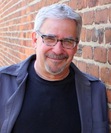Donald Levin's Blog, page 6
November 11, 2019
NoNoWriMo
As I write this, we are well into November, the month known in writing circles as NaNoWriMo, or National Novel Writing Month. It’s an annual, voluntary event in which writers sign up to work like crazy to finish the draft of a 50,000-word novel during the month of November.
All kinds of activities, tips, progress milestones, contests, camps, and supports are available for writers who take part.
[image error]If you’re interested, there’s more information here: https://www.nanowrimo.org.
As you can tell from the website, what started in the San Francisco Bay Area in 1999 with 20 people who, as the founder has said, “wanted to write novels for the same dumb reasons twentysomethings start bands,” has since grown into a monster 501(C)(3) nonprofit extravaganza, with local chapters, competitions, and other activities to help writers start and finish the draft of a book.
I have seriously mixed feelings about it.
On the one hand, I totally understand why people want to take part. Every writer has her own reasons; jumping into a novel is daunting, and finishing it is even harder. Something that helps you get started and keeps you going till the end can be helpful and necessary.
And the sheer pressure of the mass of other people who are doing it, too, can be comforting, even inspiring.
And it does work. The web site lists some of the well-known books—some best-sellers—that resulted from NaNoWriMo.
I know several people who take part in it. If you’re one of them, I wish you well, along with all the other tens of thousands of participants.
On the other hand, I know that I would never take part, even if it had been available when I started out trying to become a writer, way back in the pre-word processing days when typewriters roamed the Earth.
Challenging myself to write a novel of a predetermined length in a set time-frame is just not how I work, and it’s not how I believe novels (or, indeed, anything) should be written.
[image error]I know, it’s a cranky thing to say.
When I’m in the drafting phase of a book, I’m writing every day, just as NaNoWriMo participants do. But for me, a novel unfolds itself in its own time (it “glideth at his own sweet will,” to use the wonderful phrase from Wordsworth). I need to give it (and myself) time for that unfolding and gliding to happen.
This includes time to let the plot go off in directions that may or may not not be useful; time to let ideas and characters develop and realign; time for “Aha!” moments when I figure out what the novel, or a scene, really wants to be about; time to struggle with decisions and revisions; time to think about where the book is going; or time to let it glide along where ever it wants to while I trail behind, trying to get it all down.
While I understand the purpose is to have a draft that can be revised and reworked, if I were writing with one eye on the calendar and the other on my ultimate word count, I know none of what needs to happen would happen.
Maybe some people can pull it off. I can’t.
I’ve often said that the most important thing about a first draft is that it gets done, but I know in my heart that’s not entirely true. Yes, it’s important to get it done, but it’s also important to respect—and enjoy—the process. The novel you’re working on may (and probably will) need to be longer than 50,000 words (possibly several times longer), yet if you’re aiming for 50,000 just to be able to say you did it, then you’re not being fair to the novel that you should be writing.
Additionally, while I understand that writing the draft of a novel is hard, for me it’s also a singular, solitary, even (dare I say) holy activity. Sorry, but I don’t believe if a writer is truly called to the profession, she or he should need to be part of a competition with others to write the same number of words on the same days at the same time of year.
Like I said: cranky.
NaNoWriMo reminds me of those HGTV shows that give themselves an artificial deadline for finding, remodeling, and selling a house. Sure, it adds drama (30 days till the open house! Now 29! Now 28! Now 27 and the roof needs replacing!), but it’s an artificial drama ginned up by the fake pressure of a reality show. Even the producers of those shows admit they’re rigged.
Finally, the last—and maybe most important—thing that bothers me about NaNoWriMo is the heartbreaking number of admissions I’ll start to see around now by people who fell behind in their word counts or otherwise had to end their attempts because life got in their way. I feel badly for them; their disappointment is real, and I empathize with it.
But I want to tell them, Don’t worry, this really isn’t how it has to be done.
If you disagree with any of this, I salute you, and respect your difference of opinion. If you’re in NaNoWriMo this year, and it works for you, I wish you all the best. I get it.
If you have to drop out, or decided not to take part because it’s contrary to your thoughts about how writing should happen—well, I get that, too.
November 4, 2019
Launching POSTCARDS FROM THE FUTURE
On Saturday, November 2, 2019, I joined with my friends and co-authors Wendy Sura Thomson and Andrew Charles Lark for the official launch of our new book, Postcards from the Future: A Triptych on Humanity’s End (Quitt and Quinn, Publishers and Whistlebox Press).
[image error]If you’ve been following my posts, you know this book consists of three novellas that each offer a different, imaginative take on how humanity ends. They are dystopian visions, but ones that reviewers have described as “unique,” “beautiful,” and “well imagined,” and the book itself as “impossible to put down.”
Approximately sixty people came to celebrate the launch of the book at the historic Kresge Mansion on Arden Park Boulevard in Detroit. My co-authors and I were delighted to see so many old and new friends, relatives, and members of the metro Detroit author community who came out to support us and enjoy their Saturday afternoon.
And it was an event to enjoy.
[image error]The authors: Andrew Charles Lark, Wendy Sura Thomson, and Donald Levin
The venue was an impressive structure built in the early years of the twentieth century with the kind of meticulous craftsmanship that simply can’t be duplicated anymore.
[image error]Guests enjoyed an excellent spread of food on a buffet organized by Wendy, Karen Lark, and Suzanne Allen. Adding to the atmosphere were musicians Bradley Stern on sax and Takashi Iio on upright bass; their mellow jazz put everyone in the right mood for good conversation.
Paddy Lynch, the owner of the Kresge Mansion, generously opened his home for us. After allowing the guests to explore the home and sample the buffet, we all repaired to the ballroom downstairs. There, Andrew talked about the genesis and development of the project (he was the spearhead for it all, coming up with the original notion and enlisting Wendy and me). After that, we each talked about our sections of the book, and gave brief readings. Then we answered a few questions, and signed and sold books and chatted with our guests.
[image error]
A million thanks go to Karen Lark and Suzanne Allen for their help and support, as well as to Belinda Bonaudo Hellebuyck for creating special “scream” cookies apropos to the occasion (see below for a photo). Thanks, too, to Paddy Lynch for his generosity in allowing us to host our launch party in his home, and his gracious help in making the day a success.
And it was a great success. Besides officially launching our book, another function of the event was raising funds for Detroit Cristo Rey High School—and we raised $300 for the school.
Books, music, food, good friends, a historic setting, generous fundraising—all in all, a perfect day.
If you weren’t able to attend, our book is available to order through Amazon in paperback and Kindle, or for autographed copies you may get in touch with Wendy, Andrew, or me.
Please enjoy these photos of the event, and the splendid Kresge Mansion.
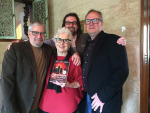
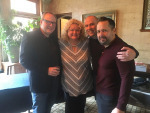
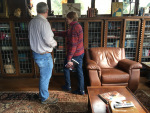





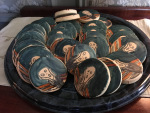
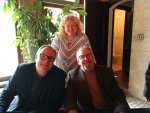

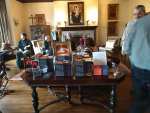
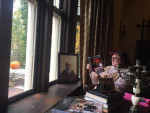
October 21, 2019
Imagining the End of the World: An Excerpt from POSTCARDS FROM THE FUTURE
About six months ago, my friend Andrew Lark invited me to take part in a project he was then developing. He was in the middle of writing the novella that would become “Pollen,” a work of dystopian fiction imagining the end of humanity, and his idea was to include two other novellas to round out a volume with that theme.
He also invited our mutual friend, author Wendy Thomson. Wendy and I both jumped at the chance. We had read and respected Andrew’s previous novel, Better Boxed and Forgotten, and we all respected each other’s work. This included Wendy’s two books, a memoir, Summon the Tiger, and a novel, The Third Order, as well as my own Martin Preuss mystery series.
[image error]
The result of our collaboration was Postcards from the Future: A Triptych on Humanity’s End, published this month (please see the end of the post for details of our book launch on November 2nd.) Besides Andrew’s “Pollen,” Wendy contributed a novella, “Silo Six,” and I added “The Bright and Darkened Lands of the Earth.”
People who know my work wondered if this project represented a departure from my mystery series. But I didn’t see it as a departure at all. True, dystopian fiction is a different genre than mysteries. But in a way, my contribution to Postcards is a mirror image of a mystery novel.
Mysteries, after all, generally start in a state of disorder (a crime has been committed or the social order has been upset somehow) and proceed to a state of order (the crime is solved, the social order is restored).
A dystopian or post-apocalyptic work, on the other hand, often starts with society in a state of order and then proceeds to disorder through some apocalyptic event or events. Or, as Newton’s second law of thermodynamics predicts, things move into a state of increasing disorder in the world of the work.
There’s also another way this isn’t a departure for me: I’ve long been a fan of post-apocalyptic fiction. It appeals to my cynical sense that “the crust of civilization on which we tread,” as scholar Timothy Garton Ash has written, “is always wafer thin. One tremor and you’ve fallen through, scratching and gouging for your life like a wild dog.”
My appreciation for post-apocalyptic fiction culminated in a senior seminar I developed at the college where I used to teach. As the capstone experience for English and Language Arts majors, the course, titled Post-Apocalyptic American Fiction, required students to prepare an extensive paper derived from in-depth critical reading and research on the topic, then make a public presentation of that paper.
Students were expected to draw upon the critical and analytical powers they had honed in their literature, criticism, and writing courses throughout their previous semesters.
To prepare the course, I read widely and deeply in post-apocalyptic literature, from the beginning (the biblical book of Revelation) to the most recent (at that time, The Hunger Games), from the classic (A Canticle for Leibowitz) to the popular (The Walking Dead), from goremeisters to the finest “literary” authors.
I read books about zombies, vampires, nuclear war, electromagnetic pulses, and crumbling societies in the past, present, and future. I read what critics had to say about them.
For my final reading list, I settled on four novels that represented what I thought were among the most fascinating, daring, and thoughtful works of contemporary post-apocalyptic literature, while still offering at least a glimmer of hope: Margaret Atwood’s Oryx and Crake (I interpreted “American” to include North American because I wanted her in), Octavia Butler’s The Parable of the Sower, Cormac McCarthy’s The Road, and Colson Whitehead’s Zone One.
I loved this quartet of novels. I had previously taught senior seminars that were among my most rewarding teaching experiences, so I was tremendously excited about the course. I couldn’t wait to teach it.
Unfortunately, it was, to put it bluntly, a disaster in almost every way.
Most of the students in this particular group didn’t understand the books; they didn’t know how to read the research about the books; they didn’t know how to approach a long, segmented critical paper; though seniors, they didn’t know how to incorporate outside sources gracefully; they didn’t have a handle on critical theories or how to use them; they couldn’t grasp the not-so-subtle rules of plagiarism . . .
Please note I’m not mocking or blaming the students here, but rather commenting on their lack of preparation for the rigors of the experience—which of course was our failure as faculty in the department.
I taught the course twice, in the fall and winter semesters. It didn’t get any better from one semester to the other. To make matters worse, I got pneumonia at the beginning of the first semester and was never at my best during the entire four months of the fall.
Needless to say, it was not my finest hour as a professor. As it happened, these two senior seminars turned out to be the last undergraduate courses I would ever teach; the following summer I was appointed dean of the faculty, and except for a few graduate courses I spent the rest of my time until retirement as an administrator.
(Which was a dystopian nightmare of a whole different order of magnitude, but that’s a story for another day.)
So when Andrew invited me into his project, I was coming from a deep involvement in, and appreciation for, dystopian literature. Naturally, I said yes at once.
Because of that background, I’m particularly proud of the book the three of us produced.
Both Andrew and Wendy’s pieces are splendid, not simply as works of dystopian fiction, but as serious and thought-provoking works of literature. As one reviewer said, the novellas in Postcards are “fascinating,” “powerful,” “inviting,” and “tense, bleak, and entirely human narrative[s].”
For myself, I had such a good time on this project that I’ve begun writing a spin-off from my contribution, and have been envisioning an entire cycle of works set in the world I imagined (which I’m starting to call the Dry Earth Series).
I’d like to share a small section of my novella with you here, in hopes you’ll be interested enough to have a look at the entire book.
And if you’re in the metropolitan Detroit area, I invite you to the party celebrating the official launch of this project on Saturday, November 2nd, from 1 till 4 pm, at the historic Arden Park Kresge Mansion, 74 Arden Park Boulevard, Detroit. To register, go to www.alarksperch.com and hit the Comment button. It’s free and open to the public, but we suggest a contribution to charity.
I’m happy to present an excerpt from my novella in Postcards from the Future, the first two chapters of “The Bright and Darkened Lands of the Earth.”
1
A figure appears in an empty window frame halfway up the ruined wall. Dark glasses in a face wrapped with rags and shaded beneath a hood stare down at her.
The long barrel of a gun points in her direction.
Caught completely out in the open, she has no time to do anything except dive to the ground. She tries to merge with the rubble, disappear into it, though she knows she can’t; she is completely exposed. She holds her breath, waiting for the kill shot. She had thought there were no bullets left anymore, but she doesn’t want to take any chances.
When the kill shot doesn’t come, she dares to lift her head. The window frame is empty.
She scrambles to her feet and turns to flee.
Before going ten feet, she comes face-to-face with the hooded figure holding his rifle.
“Halt!” the figure rasps. The voice is muffled by the layers of rags wrapped around its head beneath the hood. But there is no mistaking the rough, deep sound.
It is a raggedman’s voice.
She falls to her knees and raises trembling hands.
2
Her day started hours earlier, when the wary young woman—whose name is Ash—picked her way through the debris near the entrance to her underground settlement.
With a staff for balance and protection, she stepped over concrete blocks and ragged piles of broken bricks under the heat of the unrelenting sun. Several times she tripped over planks of charred wood from buildings that had been destroyed in the old wars, concealed under the red dust that coats the land.
Her destination was a few clicks away from their settlement. Wreckage like what surrounded the underground opening was everywhere, all along the meandering path she traveled. They were taught to avoid moving in a straight line to present less of a target, and also to increase the chances of scavenging valuables buried away from the common paths.
The woman stumbled over the detritus of what was left of the city. She wore a tattered drab coat wrapped around her despite the heat, and she protected her head with an ancient battered welder’s helmet that was the unit’s only armor against the brilliantly bright, deadly rays of the sun. This was one among a cache of similar helmets that had been scavenged over the years. Nobody knew what they were at first, but when the tribe discovered the helmets’ uses, they became treasured finds.
She walked carefully, alert to every movement around her. No animals or insects survived anymore, so chances were any movement would be hostile. The only sound was the wind soughing against the metal of her helmet. She swiveled her head constantly. The helmet restricted her view, but its protection against the damaging rays of the sun outweighed any limitations to her vision.
Ash walked over the streets, cracked and overgrown with the skeletal remains of trees and bushes. No one could remember the last time it had rained, not even the elders; plant life had turned brown and desiccated in the absence of water, disappearing like the animals.
Her destination rose ahead of her. It was a larger building than most in the area, originally three stories tall. One entire wall had fallen over in the tremor that rolled through the land the day before.
After a collapse was the worst time to be out scavenging. The dangers from old structures were multiplied after one toppled; the ground grows unsteady around them, so the ones nearby are liable to let go and fall, too. The mortar between blocks is dry, the ruined buildings unstable.
Their original purposes have been lost, but their current usefulness sometimes surprises the survivors who venture from their underground settlement to scavenge. While most such buildings, like the one Ash sought, had long been emptied of any water or food, they sometimes yielded tools or pieces of clothing or other prizes that made exploring them worth the danger. Especially after a collapse, which often uncovered treasures previously hidden to the Vengers who searched.
Ash is a Venger. When Vengers found objects that might be of use, they would bring them back to the settlement. If they found potential food sources, they were to return and inform their work unit’s leader, who would let the Vesters know. They, in turn, would go out and harvest the food. The practice had developed to ensure their survival, and so far it was working, if barely; Ash’s settlement was on the verge of starvation.
Slowly the food sources have been dwindling. As they did, so too did the tribe. The Vengers had to travel further and further from their underground settlement to find food, and sometimes they returned empty-handed and sometimes they did not return at all.
Ash paused when she was about a half-click away from the structure she sought. She scanned the sight through the dark glass of her helmet. Then, stepping carefully while still some distance away, she circled the ruin once, twice, three times, all the while keeping watch for anything moving in the wreckage. It wouldn’t take much to overwhelm her; one raggedman alone could do it if he caught her by surprise.
On her third circuit around the building, a sound reached her, penetrating her helmet. It was high and keening. Though she had not heard a baby cry in years, this brought back the sound of an infant’s mewl. Of course that would be impossible; few children have been born in the recent past. And no child would have survived for long in the outside.
She stopped, knelt low, and listened. The crying ceased, but then she heard what she thought was pounding. She raised the faceplate of her helmet, aware as she did that she was allowing the deadly radiation inside the metal. But she needed to find out what the sound was.
She lifted her head, with the helmet guard ajar so she could see into the shadows that surrounded the building. She listened but heard no more wailing.
Then she heard a scratching and scrambling in the rubble. She stood perfectly still, aware that she was unprotected outside the ruins of the building.
And that this might be a trap.
Then she looked up and saw the figure with the long gun in the empty window frame.
###
Postcards from the Future: A Triptych on Humanity’s End, by Andrew Charles Lark, Donald Levin, and Wendy Sura Thomson, is available in paperback and Kindle from Amazon.com and on order from your local bookstore.
October 14, 2019
Indie Monday
[image error]
On occasional Mondays, I’ll be featuring other authors on my blog—authors who produce quality work outside the boundaries and strictures of the traditional mass-produced, mass-marketed commercial publishing world and traditional bookstore shelves.
I’m delighted that today’s featured guest is the multitalented novelist, short fiction author, storyteller, and humorist Randy D. Pearson. Randy is the author of two novels, Driving Crazy (2015) and Trac Brothers (2018), and a book of short stories, Tell Me a Story (2016). Randy’s writing has been featured in numerous publications, including the Washington Square Review, Pets Across America: Volume 3, Small Towns: A Map in Words, Seasons of Life, Voices from the Ledges, Fiction 440: Volume 1, and Retrocade Magazine.



Recently I posed some questions to Randy. Here’s what he told me.
DL: Randy, welcome. Could you tell us a little about yourself?
RDP: Why sure! I was born in a horse stall in Wyoming . . . wait, that wasn’t me. I busted out of a giant egg . . . no, that can’t be right. My best guess (after all, I was pretty young back then) is that I entered this world in Lansing, Michigan, probably in a hospital of some sort. With an artist father (commercial artist, professor, and a marvelous painter) and an imaginative mother, creativity surrounded me. Though I couldn’t draw well—who gets a D in art?—I found I had a talent for concocting weird, unique ideas, and eventually became proficient at putting them into words. I now have three books in the world, one of which (Tell Me a Story) is my short story collection, cataloging thirty years of my work. The other two are full-length novels—Driving Crazy is a road trip comedy and Trac Brothers is an action adventure with some humor and a little bit of Michigan history.
A lifelong Michigan resident, I currently live out in the country with my wife of five-and-a-half years, a lovely stepdaughter, and four calico cats.
DL: Tell us about your latest book and works in progress. Where did the ideas for those works come from?
RDP: My latest novel, Trac Brothers, hit the shelves in 2018. It’s the story of two brothers who inherit a fully functioning 19th century handcar (like the railroad industry used back in the day). Jam and Jax find themselves stranded in the town of Manton, Michigan, and realize the only way they are going to get back home to Lansing is to put the unwieldy beast on the train tracks, and have the adventure of a lifetime. This novel has been so well received that the sequel (TB II: Santascoy’s Revenge) is in the works, hopefully for a 2020 release.
The idea for Trac Brothers flooded my brain one day while parked at a railroad crossing. The gates came down, but the train hadn’t shown up yet. My mind wandered back to the old silent films, and I thought how funny it would be if two guys came slowly pumping past in a handcar. The story blossomed in my head, and I sat there mentally writing it, until cars behind me started honking! The train had come and gone, and I sat there dreaming of brothers with a handcar.
DL: Why do you write? What do you hope to accomplish with your writing?
RDP: My brain has a condition that I call “What-If Syndrome.” When some mundane thing happens in my life, I immediately spin off into some sort of wild tangent . . . what if THIS would’ve happened instead? I have also missed the ending to countless movies and TV shows because I’m mentally creating a “much better” story than the happenings on the screen.
I write because if I don’t get these ideas out of my head, they won’t stop bouncing around! Ideas from twenty+ years ago still nag and pick and needle at me! Eventually, I have to say ENOUGH and let them out.
As for what I hope to accomplish, simply enough, I just want to entertain. I don’t care about being rich, and my wife says I’m not allowed to become famous. I just want people to hear or read my stuff, and come away feeling like it was time well spent.
DL: Please talk a little about your writing process. What is your favorite part of the process? Least favorite?
RDP: As you can gather from my previous responses, I usually write stories in my head first, long before I ever enter them into my computer. For short stories and for my first novel, Driving Crazy, I generally write them completely in my brain, let them percolate and circulate for several days (or weeks . . . months . . . years . . .). I find I can’t start writing a story if I don’t have some idea how it ends. I hate writing myself into a corner! However, with Trac Brothers, I finally had to start putting the ideas down in sections due to the scope and complexity of the story. I tried doing an outline, but that wasn’t working for me, so I ended up writing a five-page synopsis of the entire story—essentially a short story version of the novel, hitting the high points. That helped me to keep on track, so to speak.
My favorite part of the process is seeing how the story and the characters develop. I can’t tell you how many times characters have done things I didn’t expect them to do. It’s the coolest sensation!
Least favorite has to be editing. I hate cutting my babies! Though I tend to keep the purged bits and put them on my website—if movies can have deleted scenes, why can’t novels?
DL: Could you reflect a bit on what writing or being a writer has meant for you and your life?
RDP: For me, writing has always been a release—getting these wacky and wonderful ideas from my brain to a computer screen or page. When I was young, I didn’t write for others, only for me. In my teens, I would hand-write my stories, or type them on my Atari 400 computer and print them on a dot-matrix printer. Sometimes, if I felt brave enough, I would show them to family and friends. They would generally say something like, “This is cool,” or “how fun,” and that would be the end of it.
In my late teens and early 20s, I started posting my short stories on my BBS (Bulletin Board System, the precursor to the Internet). I ran a couple of BBSs with my various Atari computers—one called Magrathea and other The Fletcher Memorial Home. Again, people would read the stories and give me vague platitudes and verbal pats upon the back.
It was only when I joined Writing at the Ledges, the phenomenal writing group out of Grand Ledge, Michigan, did I finally start receiving constructive criticism and honing my craft. This led me to become a published author in 2008 when they released the first of their group anthologies, Small Towns: A Map in Words. I learned how to format, how to edit critically, and how to market /sell. With this understanding of how to publish under my belt, I was able to bring Driving Crazy to the world in 2010. Today, people have read my stories and articles in a couple dozen periodicals, anthologies, websites, and magazines.
In terms of what it means for me to be a published author, it has given me a great number of gifts. I’ve done hundreds of events since my first one at the 2008 Grand Ledge Island Art Fair. Being in front of people, reading stories or hawking my books, is an exhilarating experience that would’ve terrified the younger me. I enjoy entertaining, and am delighted that my stories have brought elation to so many people. I’ve met dozens of authors and readers, many of whom are now dear friends . . . and in one case, even more. During an author event at Everybody Reads in Lansing, the owner introduced me to a wonderful woman named Wendy. A couple years later, she became my wife.
DL: What are links to your books, website, and blog so readers can learn more about you and your work?
RDP: My website is https://www.randydpearson.com. Here readers will find links to my three novels, including excerpts and those fun deleted scenes, as well as short stories, articles, pictures, and a list of events.
My books are also available on Amazon. My author page is https://www.amazon.com/Randy-D-Pearson/e/B01DPZ04WA.
October 7, 2019
Three Favors
I’ve been reading a lot of online postings lately about people dealing with their grief over loved ones—brothers, sons, parents, spouses—who have died. I suppose I’m sensitive to the subject at this time because the anniversary of the death of one of my loved ones, my grandson Jamie (the model for Toby in my mystery series), came around a week and a half ago.
Jamie was twenty-five when he died, and we all loved him dearly; his brother Alex used to say Jamie was the glue that held the family together. He was in a year-long vegetative state that preceded his death, and that somewhat prepared us for losing him. But we still weren’t ready for the 2:30 a.m. phone call from his mom telling us he was gone.
Who is ever prepared for that call?
Even now, eight years on, his loss is still hard to manage. I find myself talking to him almost every day, narrating my life, telling him how much I miss him. When I find feathers on my walks, I like to think Jamie left them as reminders that he is still around in some form.
[image error]
Wishful thinking, I know; dead is dead.
So when I’ve been reading about how people are trying to come to terms with their grief over loved ones who have died, I empathize with their losses deeply.
But there’s another kind of grief—the grief that comes in the wake of losing someone you should have been close to, but weren’t. Sometimes what you grieve for then is not the loss of the person from your life, but the loss of the possibility that any closeness could ever happen.
While that could describe my entire family of origin, I think of it particularly in terms of my brother Cal.
His name was Charles, but everybody called him Cal because of his initials: Charles Allan Levin. He died in 1984; he was only 41 years old. He was older than I by six years, and for a variety of reasons we weren’t close as brothers. Or even as strangers, for that matter.
[image error]My brother, 1960
Not only were we completely different personalities. Much of the problem in our adult years came from his long-term drug use, which wreaked a seemingly endless havoc on the family, as these things will do.
It’s conventional to say people died after a “long battle” with drug abuse, but that’s not quite true in his case. He didn’t so much fight against the drugs as embrace them like a lover. Yet even as I write it, I know that’s not exactly accurate either.
He died in a YMCA in Honolulu after failing to complete a lavish drug-treatment program in Hawaii that he conned my father into paying for. My father told everyone (including me) that Cal died from emphysema, but on the death certificate I saw the actual cause of death was amphetamine poisoning.
The only surprise was that his usual drugs of choice were barbiturates and pain-killers.
My last contact with him was several years before he died, when he called to ask me for money because our father (his usual touch) was out of town. I refused, and he hung up on me.
As you might expect, my anger at him and what he did to the family was profound and corrosive. It lasted for a long time, both before and after his death. He sucked up all the oxygen in the family for years; he and my parents formed a demented triad of mutually-assured destruction that left me on the outside looking in on my own family.
As I grew older, however, and gained some distance on it all, and began to deal with my own issues created by our family which was, if not broken, then really really bent, my attitude toward my brother began to change.
I started to get some insight into why he turned to drugs, and why he had such a hard time giving them up, or even admitting he couldn’t live without them. I started to see that, far from being the reason for the upset in the family, his drug use was a reaction to existing family problems, which of course only worsened because of his addiction.
I came to realize that the pain affecting me from my family pre-dated his antics, and also affected him. I understood we each tried to deal with that pain in different—albeit equally ineffective—ways.
When I started writing poetry, I found myself writing some about my brother. One in particular helped me come to a sort of accomodation, if not forgiveness, with him, in part through a recognition finally of both what he had lost and of the similarities between us. I think this poem captures those insights.
A version of this poem appeared in the April 2004 issue of Saucyvox.
Three Favors
1
It is 1966 and I’m struggling
to figure out the chords for “Desolation Row”
needle-dropping on my turntable
when my brother calls from next door where
he and the neighbor are watching a movie
and the 16mm projector jammed.
“Can you try to get it going?”
A simple problem to diagnose:
the worn sprockets on the well-watched film
have twisted over one of the feeders.
The curl in the plastic needs to be freed
and the film rethreaded. I start
the old machine and in the square of light
thrown on the screen in the neighbor’s bedroom
appear grainy black and white images
of a truly epic blow job
in extreme close-up, a woman’s lips
and sinuous tongue slaver up and down
a monster phallus glistening with spit
for longer than I would have thought possible.
My first stag flick makes me gape in wonder
at the animal rawness of it
as though it is a documentary
about an encounter between two apes
and the camera morbidly scientific
instead of pornographic—exactly
the opposite of erotic, with
a sound track filled with soggy sucking
and a man’s hammy moaning
tinny on the project’s tiny speaker.
When another actor enters the scene
and begins to take his own clothes off
I judge I have seen enough and leave them
to their whoops and fun. “The world’s longest
blow job,” the neighbor chortles. I return
to the silence of my own room
where I take up my guitar again
and rest an ear on the curve of its shoulder
to let the hard vibrating wood
ring the bones of my head like a bell.
2
The second time, 1971,
we stay in the Southfield apartment
where our parents moved when they fled Detroit.
My brother needs a ride to a job
to meet a friend, this contractor,
he tells me, and he can’t drive himself
since he wrapped his Mustang around a tree.
I am in another room, this time reading
(I’m in my hard-boiled mystery phase)
when his spare and stricken figure heaves
into the doorway. “Can you give me a ride?”
he asks, his scarred right arm hanging limp
at his side, casualty of a scalding bathtub
he had fallen into once while stoned.
This is the time when he makes phone calls
day and night cadging prescriptions for pills
from shady physicians. He tells them
he is a cancer patient from out of town
grappling with terrible pain. He makes
his voice quake in pretend agony.
He directs me to a cracked and potholed street
on the east side of Detroit where we roll
to a stop outside a house with black paint
hiding living room windows and high grass
gone to seed in the lawn. He steps from the car
uncertainly and hobbles stiff-legged
up the walk. Rings the doorbell and waits.
It occurs to me this is not about a job.
No light escapes from the front door
that cracks to allow him entrance.
A minute later he is out, walking fast.
“We’re done,” he says, and drops into the car.
“Take off.” I smell his sour sweat and his voice shakes,
this time for real. In his lap he cups
something small, like an animal he shelters
and gives me a sidelong glance that says more
than I want to know about fear and shame.
For the rest of the day he wanders around
the apartment with a spoon in his pocket
and I stay in my room and read about Sam Spade.
3
‘Seventy-seven, in another room,
grading essays for my classes at Wayne State
when my brother phones, which he never does.
Our father is away for the weekend. “Can I borrow
fifty bucks?” he asks. “I swear I’ll pay you back.”
I don’t even remember why he said
he wanted the cash, but I thought I knew.
He must have been desperate indeed
to try me. But I am through granting favors.
I blame him for every unhappiness
visited on our family, for all the problems of my own.
“Don’t lay that on me,” he spits, and hangs up.
It is the last time I speak with my brother.
Years later he is dead, found in a room
at the Y in downtown Honolulu.
Today, older than he would live to be
I imagine bars of tropical sunlight
peeking through his window blinds, striping
his decomposing body, his mouth twisted
in lines deep as cracks in asphalt, hair wild
as stalks of unmown grass as he sprawls,
melting after seven undiscovered days,
across his narrow bed, forlorn as a poor woodsman
in a dismal tale who has squandered his three wishes
and died alone, without family, friends, job,
or money, having lost, along with his
precious time in the sun, his last lucky chance
that some indifferent lips might try,
tirelessly, to coax him, childless and self-
abandoned, back into despondent life.
September 30, 2019
Ethics and Killer Copters
In 1985, in the midst of a worklife marked by almost constant professional reinvention, I found myself sitting around a table at an IBM facility near Binghamton, NY, having one of those “What Am I Doing Here?” moments.
I was sitting with two guys from the local branch of IBM’s Federal Systems Division. Their division, as the name suggests, undertook a variety of contracts and projects for the government.
We were talking about a project they wanted me to do. I was then a free-lance writer specializing in, well, anything anybody wanted to hire me for. At the time, I found myself writing a lot of scripts for training and promotional videos, and they wanted me to write one of those.
The project was titled, “The LAMPS MK II Radar Data Processor: Flight Test Report.”
Briefly, the LAMPS MK II Radar Data Processor was a complicated system of electronics to improve the reliability and effectiveness of radar, data-linking, and other key operations of helicopters.
Despite the bland title, the project wasn’t just a report on the system’s flight test. The real purpose was a script for a training and sales video for the new helicopter system. The script had to sell the system, which meant I had to buy into its value, at least for the duration of the project.
The thing was, this wasn’t just for any kind of helicopters. It was for what are called “destroyer helicopters.”
And as that name suggests, these were weapons of war. Helicopters that blow stuff up and kill people.
This was a few years after the Falkland Islands War (look that up if you never heard of it), and as the two guys from IBM were giving me information I needed to write the script, they were getting more and more excited about the capabilities of their product. In fact, it wasn’t long before they were literally whooping and hollering and flying their hands like helicopters over the table and bouncing up and down in their chairs talking about how GREAT this system was at killing things, and what the Brits could’ve done if they’d had these little babies in the Falklands.
Seriously, it was like something out of “Alice’s Restaurant.”
So here’s the scene: me—a young writer, pacifist, Viet Nam war protester, what my first roommate in college (an engineer) disparaged as an “arty type”—sitting in the room with two suits who were acting like they were crazy.
So what was I doing there, you may ask?
As I said, I was then a free-lance writer. When you’re a free-lancer, you wake up every day and you’re basically unemployed, which means you have to scrounge for work constantly. And therefore, like most free-lancers, I was mostly broke. The IBM job wouldn’t make me rich, but it would help to stabilize my bank account until something else came along.
And anyway, I told myself, it was just a job; my real writing, the writing that mattered, was the fiction I was learning how to write.
I was reminded of this the other day when I saw a quote from Tony Schwartz, the ghost writer of The Art of the Deal, arguably (along with his reality tv show) the thing most responsible for creating the pernicious myth of Donald Trump as a successful businessman.
“Trump is the most purely evil human being I’ve ever met,” Schwartz said.
My first thought was, “And thanks for doing your bit to help him con the country, Tony.”
But then I thought, even if he knew how awful Trump was, Schwartz probably had no idea somebody like Trump could ever become president, and anyway he was doing exactly what I did when I took on a job writing about destroyer helicopters: doing what you have to to get by.
I don’t know how Schwartz felt about his project, but I felt terrible about mine. I knew it was wrong, and I had tried to persuade myself that my financial situation would somehow excuse it.
Except it didn’t.
I wasn’t the same afterwards. I learned, in a way I had known really only theoretically before, that there is no such thing as an ethically neutral action. In particular, for writers, there is no such thing as ethically neutral writing. It all has consequences for which we are responsible, no matter what kind of writing we do.
I have left that life behind, but I’m still writing, and I’m writing in an area that is fraught with ethical conflicts. I’m a mystery writer: I write about crime; I write about violence and its effects. I write about things that bad people do.
In my Martin Preuss mystery series, I’m constantly dealing with the question: Is it possible to portray unethical actions ethically? Don Winslow puts it another way: “Is it possible to live decently in an indecent world?”
I can’t say I’m doing it well, but I think the answer to both questions is yes. The key for me is to write with a consciousness about about how I portray violence, which is a tremendous social problem—not only violence in action, but in language and thought as well.
Those of us who work in a genre that is so associated with violence have a special duty to treat it responsibly, to treat it, that is, ethically.
This means not only not glorifying it, but showing the truly awful cascading consequences of violence on everyone associated with it, perpetrators and victims and bystanders. And, in my case, to make sure the books present a clear ethical alternative to the unethical actions that flood my fictional world.
As I’ve said elsewhere on this blog, at this particularly dreadful moment in history, we need a literature that allows us to enter imaginatively and empathetically—and ethically—into the experience of others, individuals as well as the group, and be transformed. We need a literature that expands, not contracts, our sympathies.
I try to do that in my mysteries. The books go beyond simply offering readers a tricky puzzle to pass the time with, and instead help them to enter the minds and hearts of my characters, and see and understand the world through those eyes, too.
For those of you who know my work, you might also recognize that Toby, my main character’s profoundly handicapped son, is (among all the other purposes he serves in the series) an important ethical touchstone for his father. And, I hope, for my readers.
A few years ago I was at a writers’ conference and we were talking about killing off characters. I made some remarks about the rather cavalier way people were talking about doing away with their characters, and one of the other writers called me “the moral compass” for the group.
She was kidding, but I loved that. I welcomed it, in fact. My moral compass might not have started forming with those two guys jumping up and down about the joys of killing helicopters, but that day certainly got me headed in the right direction.
September 23, 2019
Coming in November: A new dystopian anthology
I’m pleased to announce that I’m joining two distinguished local authors to celebrate the release of our first collaborative project at a book launch party at the historic Arden Park Kresge Mansion in Detroit on Saturday, November 2, 2019, from 1 till 4 p.m.
[image error]
Andrew Charles Lark, Wendy Thomson, and I have been working hard on the anthology of original dystopian novellas. Titled Postcards from the Future: A Triptych on Humanity’s End (Quitt and Quinn Publishers/Whistlebox Press), it’s currently in the final stages of production.
At the launch, we’ll read from our sections in the book and sign copies, which will be available for purchase.
The original idea for the book was Andrew’s, and when he invited Wendy and me into the project, we both said yes immediately.
Andrew is the author of Better Boxed and Forgotten, a supernatural thriller set in Detroit’s Indian Village. Wendy is the author of Summon the Tiger, a memoir, and The Third Order, an international tale of suspense.
My previous works include the six novels in the Martin Preuss mystery series (Crimes of Love, The Baker’s Men, Guilt in Hiding, The Forgotten Child, An Uncertain Accomplice, and Cold Dark Lies); two books of poetry, In Praise of Old Photographs and New Year’s Tangerine; and a mainstream novel, The House of Grins.
The three pieces in Postcards from the Future are thoughtful and engaging short novels that embrace the precepts of the dystopian—a subject much in the news lately owing to the recent publication of Margaret Atwood’s new novel, The Testaments, her sequel to The Handmaid’s Tale.
Each of the works in Postcards from the Future offers a dark and imaginative take on the end of humanity:
Andrew’s “Pollen” is a riveting multiple point-of-view account of a strange atmospheric phenomenon that destroys humankind’s ability to reproduce, ushering in the extinction of our species.
Wendy’s “Silo Six” is a suspenseful story of love and survival set far into the future when the sun begins its transformation into a red giant and scorchesthe earth into a virtually uninhabitable cinder.
My “The Bright and Darkened Lands of the Earth” is a gripping tale set in a desperate, post-apocalyptic future where a heroic woman battles ecological and social collapse in an effort to save her tribe—and humanity—from certain annihilation.
[image error]
The Arden Park Kresge Mansion is located at 74 Arden Park Boulevard in Detroit. The launch celebration will be quite an event; in addition to our readings, it will feature live music and refreshments along with an open house at the historic mansion. The event is free and open to the public, though a small donation to support Detroit Cristo Rey High School is suggested.
Space is limited, so if you’re interested in attending the launch, please RSVP through the Contact tab at Andrew’s page, www.alarksperch.com.
If you can’t get there, our book will be available in November through Amazon in print and ebook formats, and on order from bookstores.
For me, writing my section was great fun and a wonderful change of pace from my mystery series. I’ve already started to work on a spin-off from my novella, and I’m looking into an entire cycle of works based on what I’m calling the Dry Earth Series. Watch for more information as this develops!
September 16, 2019
On Advice, and Where It Comes From
This morning over coffee I saw one of those ubiquitous bits of Facebook wisdom attributed to everyone from Anonymous to Abraham Lincoln to Morgan Freeman. It said, “Some of the best advice I’ve ever been given: Don’t take criticism from someone you wouldn’t ever go to for advice.”
No matter who said it, when we’re starting out as writers, we’re always (or should be, anyway) looking for advice and help from established authors. When I give talks, I’m sometimes asked what was the best advice I ever received. I’m hardly ever asked what was the worst advice, yet that can sometimes be as useful as the best advice.
Back in the seventies, when I had written my first novel, I gave the manuscript to the author John Gardner to read, comment on, and, I’d hoped in my wildest dreams, recommend to his agent. Gardner is no longer with us, but at the time he was quite a famous guy. I was hungry for what he could tell me.
Not to be confused with the John Gardner who took over the James Bond series, this one wrote some best-selling literary novels in the late seventies and early eighties (including Grendel, The Sunlight Dialogues, October Light, and Mickelsson’s Ghosts) in addition to children’s books, well-regarded books of criticism, and—guess what—advice for writers (The Art of Fiction, On Moral Fiction, On Becoming a Novelist).
At that time he was running the creative writing program at the State University of New York at Binghamton, New York, and he was friends with my wife, who was also teaching in the English Department.
I was an adjunct instructor in the department, and had met him on several occasions. He had the reputation for being extremely helpful to apprentice writers. I’d see him around the department, and in my interactions with him he was warm and friendly, and treated me like a colleague. He asked to see some of my writing, and told me he’d publish me in the new literary journal he had started at Binghamton, he’d recommend me to his agent, he’d help get me published, and so on.
I had written a draft of a novel, my first, a kind of bildungsroman about a young man who gradually learns to get in touch with “the life he had lost in living,” to paraphrase T.S. Eliot. Called Vital Signs, it was a typical first book, not groundbreaking, I knew, but still I thought it had its merits.
I put it off as long as possible, but I finally screwed my courage to the sticking place and with high hopes I gave him the manuscript.
Time passed.
More time passed.
Even more time passed and I hadn’t heard back from him. So one night, when we were both at the English Department’s annual Christmas party (a huge event, since the department was large, with large undergrad and grad programs), I took the opportunity to approach him to ask if he’d had a chance to read the book.
He told me he had.
And he told me my book was evil.
He didn’t mean it as a compliment. Not like, “Dude, your book is eeeeevillllll!”
No, the best-selling author of On Moral Fiction had just told me I’d written an evil novel.
Evil, as in morally corrosive.
As in bad. As in no good.
I’d read On Moral Fiction . . . I knew what he meant: it was trivial, it was boring, it was a lie.
He told me there wasn’t much to do with an evil book.
As you might expect, this was not good news. Here was this big-time, best-selling, hot-shot author known around the English department (and indeed, around the country) as a generous and helpful mentor of young writers, and all he had to say about my book was that it was evil.
It was a blow it took me a while to recover from. (If you’ve read my June 4th blog post, you’ll know this was one of a series of blows that drove me away from writing for awhile.)
Two things happened that helped me come to terms with it. One was what I subsequently learned about that night. Not only was he drunk when I talked to him at the party, but his wife had sued him for divorce earlier that day.
So he was not only plastered, but he was in a particularly foul mood.
The second thing was, a few days later, I got a note from him, apologizing. He told me he enjoyed the book, that he meant to just skim it but it engaged him so much he read it through entirely, that there were many good things about it, and that he would gladly write a blurb for it.
That salved the wound, but the constant little demon-critic who lives on our shoulders still had me wondering: was it really such a bad book that it took drunkenness for him to be honest about it? In vino veritas?
Still, I gained a lot from this interaction with Gardner—not so much that I am an evil writer, but that you really do have to be careful about whom you seek criticism from (despite all his gifts, Gardner was, I subsequently discovered, an extremely, even reactionarily, conservative critic); you have to be careful about when you ask for it; and—most of all—you have to be very careful about investing too much in what you hear. Another writer, even the hottest, best-selling peddler of moral fiction, is just another point of view, a man or woman with problems and limitations of perspective and weaknesses and failed marriages that sometimes color the advice.
I also learned the importance of being kind when dealing with a young writer, something I never forgot when I became a professor, and, ultimately, a published novelist and poet interacting with other writers, both beginning and established.
I never did publish that manuscript I gave Gardner to review, but I published lots of other things, and why I was able to go on writing was due in part to something he wrote about being a novelist. In fact, it was the best piece of wisdom I’ve ever read about writing in his On Becoming a Novelist:
”Finally, the true novelist is the one who doesn’t quit. Novel-writing is not so much a profession as a yoga, or ‘way,’ an alternative to ordinary life-in-the-world. Its benefits are quasi-religious—a changed quality of mind and heart, satisfactions no non-novelist can understand—and its rigors generally bring no profit except to the spirit. For those who are authentically called to the profession, spiritual profits are enough.”
I’ve gone back to this paragraph time and again for its wisdom. While the episode with Vital Signs was demoralizing, it turned out that Gardner’s words have seen me through some difficult times, after all.
September 9, 2019
What I Learned from Reading Walter Mosley
Before retiring, I taught at a college in Detroit where the big event of the year was a Contemporary American Authors Lecture Series held each spring. This series brought in a guest African American writer each year to give a free public reading and hold a master class with our own and area high school students.
For nine years, I was chair of the English Department that hosted the event. That meant I was the emcee for the evening; my job was to preside over the gathering and, if necessary, introduce the writer.
One of the guest authors I introduced was Walter Mosley, author of the Easy Rawlins and Leonid McGill mystery series, among many other books.
[image error]
Rarely had past writers (mostly literary novelists and poets) prompted the kind of passionate public excitement that Mosley did. For months leading up to the reading, phone calls flooded the department from the public as their anticipation mounted.
Among the callers were people wanting not only the usual information—time, place, and so on—but wanting also something more, wanting, if not needing, to talk about Mosley’s works . . . callers who were simply bursting to talk about their favorite characters with the stranger on the other end of the line; callers wanting to know which were my favorite books, and who I liked better, Easy Rawlins or Leonid McGill; callers wanting to know what did I think of that hussy Katrina and why would Leonid ever want to stay with her?
Clearly, his readership idolized him.
To prepare my introduction of him, I gave myself a crash course in Mosley’s works, reading deeply and broadly in all the series as well as the stand-alone books that he had published as of that point.
As a crime writer myself, I read with a double vision: looking for not only what I could use in my introduction of him, but also what I could learn from him for my own writing.
At the end of my reading project, I found much to learn, both in terms of what to do and what to avoid as an author.
I have to say that many aspects of his writing turned me off; the cliched uses of violence and sex, for example, as well as the (to me) annoying similarity of plots and situations from book to book, as when his main characters stop what they’re doing to explain where their next bit of wisdom came from.
Even so, Mosley’s good at what he does, and it was useful for me to understand why and how.

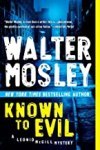
I came to see that Mosley’s work grabs his readers for many reasons. He pulls some in because of the powerhouse prose, the clarity and precision of his eye, the dialogue that crackles with authenticity. Others read him for his way with a story, for plots that hook readers from the first line and don’t let loose till the final page.
Still others loved seeing his strong black characters, male and female, negotiating their way through a complex and often dangerous world. His main characters—Easy, Socrates, Fearless, Leonid, and others—are so engaging because how they work the borderlands between communities serves as a metaphor for the complexities of race in America.
Still others loved the way the quests in his works are always, ultimately, about redemption.
Beyond that, what I learned as a writer had to do with technique: how to set up characters that are vivid and relatable, how to manage multiple plot lines, and how to move the story along quickly and effectively.
One of the things that struck me most about the phone calls that came in while we were preparing for his visit was the almost fanatical devotion his readers have to his characters. Mosley has an incredibly deft touch in populating his fiction with people whom his readers recognize from their own lives, and who fairly leap off the page.
He lets his characters—especially including his first-person narrators—talk in voices that are recognizable and real, and he paints thumbnail portraits of how they look and act, down to the nuanced shades of his characters’ skin tones, in ways that resonate strongly with his readership. He knows his audience and writes to them.
He also adroitly handles three, four, and five interrelated plot lines at a time. My metaphor for what he does is weaving different threads through the fabric of the books. For example, in his Leonid McGill series, main character McGill routinely has to negotiate his family dramas with his wife and children, his love life with his girlfriend, his two or three current cases, and the ever-present past that he struggles in vain to outrun and outfox.
Mosley’s books are busy without seeming overcrowded. I think that, too, partly contributes to the reality of his characters: life is like that.
Finally, for me his work is a master class in how to move those different plot threads along quickly, including the importance of starting scenes at the optimum moment, shaping them for maximum impact, and ending them with enough suspense to get the reader to turn the page; jumping into a chapter or section using a judicious exchange of dialogue or action; and using the transitions of getting the main character from one place to another efficiently.
As I sit down to write the mysteries in my Martin Preuss series, I find myself putting these lessons into practice time and again. It’s another reminder of how much we can glean from critically reading authors who are at the top of their craft.
Are there lessons you’ve learned from your favorite authors? I’d be interested in hearing about them.
August 19, 2019
An Interview with Martin Preuss
A good friend, Mark Love, is the author of a wonderful series of police procedural novels that he calls the Motown Mysteries. (I interviewed Mark in an earlier post on this blog.) He had the great idea of inviting authors to conduct “interviews” with their main characters on his blog, and his latest interviewee is none other than Martin Preuss, the MC of my series of Ferndale-based mysteries.
[image error]
You can find the interview on Mark’s blog at motownmysteries.com. You’ll also find lots of other great posts there, including an interview with Mark’s own detective, Jefferson Chene, and information about Mark’s Motown Mysteries and his other writings.
(Mark wanted to include a photo of what I thought Preuss would look like, but Preuss refused to cooperate . . . so sorry, no photo!)
Here’s the text of that interview. See if you learn something new about the intrepid Preuss!
Welcome, Martin Preuss. Tell us a little about yourself:
MP: This is a hard question for somebody like me to answer . . . These are all hard questions for me, as a matter of fact. I’m a very private person, and I’m not used to sharing much about myself. I’m not one of those people who will tell you their whole life story within the first half-hour after you meet them. You might pull it out of me, but only after I’ve known you for a while. That’s why I’ve put off doing this interview.
But here goes: I’m currently a partner in Greene & Preuss Investigations, a private detective agency in suburban Detroit. Before that I was with the Ferndale Police Department, working my way up from patrol officer to sergeant in the Detective Bureau. I’m from Ypsilanti, Michigan, where my parents were professors at Eastern Michigan University and my brother—well, let’s just say he was good at what he did, and what he did was being a major-league drug addict and all-around jerk. I started college at EMU, but when I married a fellow student, Jeanette Russo, when she got pregnant with our first son Jason, I needed a job to support them. Her father, Nick, was a detective in the Ferndale Police Department, and he’s the one who convinced me to join up. I finished my college degree at Wayne State University in Detroit. Our family was complete when our second son, Toby, was born. Toby has lots of handicaps, but man, nobody has ever been loved as much as that boy is.
How did your background get you involved in the latest novel, Cold Dark Lies?
[image error]MP: After I retired early from the FPD (thanks in large part to the efforts of Nick Russo, but that’s a longer story), I was at loose ends . . . I wasn’t even fifty, with the rest of my life ahead of me, and didn’t know how I was going to fill my days from then on. An 83-year-old private investigator I had met on one of my previous cases, Manny Greene, had been after me to join his one-man agency. I wasn’t keen on doing that; I thought I should do something else, something new. But when Manny—that wise, wise fellow—asked me to look into the disappearance of a young man who hadn’t been seen for forty years, I realized (as I’m sure he knew I would) that investigation is what I was best at. So I joined his agency, and one afternoon when he was tied up and unable to keep a meeting with a new client, he asked me to speak with her. She wanted to find out how her brother wound up strung out on drugs at a skeevy motel in Ferndale, so the Ferndale connection got me hooked and this book was off and running.
Who came first, you or the author?
MP: Levin likes to think he invented me, and I just let him keep on in that delusion. You know how sensitive these writers are.
What is it about this story that sets it apart from the others?
MP: From the other stories in the series, you mean? I think this story is timelier than the other cases. It’s about the impact of the opioid crisis, which is in all the news reports lately. But it’s about the crisis as seen from “ground-level” . . . and by that I mean, it shows the impact of middle-class drug use on the lives not only of the drug users themselves, but on the people who love and care for them. The story show how devastating drug use can be as it destroys lives and brings people in touch with the worse of themselves, as well as the worst of humanity.
Tell us something about your background that may or may not be revealed in the book?
MP: Most people won’t know that I was terribly shy as a boy. (Of course, most people won’t know much about me, as I was saying earlier.) Looking back, I could guess it had a lot to do with my family-of-origin; I was often overwhelmed by the goings-on inside my family. My parents were smart people—they were professors, after all—but that didn’t mean they were always good or even well-intentioned. My father was an alcoholic and my mother was a classic enabler; all her attention went toward protecting my father; my brother and I felt like intruders in our own home. I remember all the times she would shush my brother and me because “Daddy was working,” which usually meant he was in an alcoholic stupor in his home office in the basement. My brother had his own drug problems (my brother’s problems were, eerily, reflected in the case in this book), and sometimes it seemed like I was raising myself. I wound up with the family disease, too . . . I became an alcoholic myself, until Jeanette died. After that I stopped drinking. If I had stopped earlier, things might have been different, but . . . as I always say, if things were different, they wouldn’t be the same.
Are you the type of person who always seeks out the company of others?
MP: Uh, no. I’ve got a few friends—Janie Cahill and Reg Trombley, two of my former colleagues in the Ferndale PD, in particular—and some musician friends (I play rhythm guitar in a band occasionally, whenever I can make the gigs, and I know a lot of musicians around town), but I pretty much keep myself to myself. Reg has his own life with his wife and two daughters and his career in the department, and Janie and I . . . well, our history keeps getting in our way. I might have met someone in this latest book who can pierce through my loneliness, but we’ll all have to wait for the next book to see how that turns out.
What do you do to relax after a day’s work?
MP: I spend as much time as I can with my younger son, Toby. I love the guy more than words can express. He’s multiply-handicapped, with problems that fill a couple of pages on his school IEP: visual limitations, profound cerebral palsy that left him unable to care for his own personal needs, cognitive delays, microcephaly, seizure disorder, the delicate bird bones of his legs that can’t hold up his weight and beak if too much pressure is applied during physical therapy (he’s had a few broken legs). And yet, for all his problems, Toby is the happiest, most content person I’ve ever known. Whenever we go anywhere, he has the best time. He radiates an aura of peace and gentleness that is his default state, spoiled only if one of his physical ailments bother him.
I usually visit him first thing in the morning, before he gets on the bus that takes him to his school program, and I stop in after work or before his bedtime to help give him his bath (his favorite thing in the world), read him some chapters from his Harry Potter books, and spend time talking with him and playing guitar for him as we both unwind from our days before kissing him good night. He lives in a group home because I can’t take care of all his needs by myself with my crazy schedule, first as a detective and now as a private investigator. Not having him live with me is one of my bigger regrets.
Which do you prefer, music or television?
MP: Oh, music, no doubt. I can’t remember the last time I even turned on a television, but music means a lot to me. When I was young, I thought I would be a musician, in fact. Music was a way out of the dreadful realities of my family life.
Who’s your best friend and what influence have they had on your life?
MP: That’s an easy one. Anybody who’s read my books knows the answer to that: My dear son Toby. He’s blessed with a seemingly infinite capacity to offer and accept love from the people who take care of him (including, of course, me), a zenlike patience with the shortcomings and imperfections of other people, an eternal innocence, an ability to savor the best of every moment, and an inability to show or possibly even feel anger. As limited as Toby’s life could be, I often envy his way of being in the world. I sometimes yearn for my son’s blissful contentment, and wish I could learn enough from the boy to be able to replicate it all for myself. He’s also my sounding board for difficult cases; even though he can’t articulate words because of his cerebral palsy, I assume he understands everything I tell him, and talking over my cases with him helps me to get my sometimes-scattered thoughts in order.
What’s your greatest strength? And of course, we want to know the opposite, your greatest weakness.
MP: I have one main strength: what Toby has taught me. Toby keeps me grounded, listens to me puzzle through my cases, and continually shows me what’s really important in life. And it’s not being a hard-drinking, womanizing, wise-cracking, shoot-first tough-guy detective like a lot of fictional detectives. No, it’s being more like what I try to learn from Toby . . . being intuitive; patient; understanding; gentle, even (I refused to carry a gun when I was on the force because I believe violence only creates more violence); and in general more real and down-to-earth than other fictional detectives. You can’t do any of that if you’re busy smashing somebody’s head in.
My weakness? I’d say spending too much time in my own mind, and not being open enough to the vagaries and randomness of life. I was an English minor in college (I started out as a history major), and I remember reading about a character who said he wanted the world to be “at a sort of moral attention forever.” Too often I feel like that’s what I’m like: too guarded, too shut off. It’s something I need to keep pushing against.
What has been the most romantic thing you’ve ever done or instigated?
MP: Well, romance isn’t something I’m comfortable with. My wife died in a car accident several years ago, for which I (and my older son Jason) blame myself even though I wasn’t driving. After one of our wilder fights, she threw the kids in her minivan and took off for her mother’s place up in Traverse City. She never made it: a drunk driver t-boned the car, killing her instantly and injuring the two boys. Since then I haven’t been involved with anyone; I’ve been in a kind of self-imposed exile from relationships.
I guess you might say it’s from the guilt I feel over her death. I’ve had a few close calls with a couple of women, but nothing has worked out since Jeanette died . . . I haven’t even gone on a date, much to the chagrin of the people who read about me. To recall a romantic gesture, I’d have to go back to when Jeanette and I were married—and even then our last few years together were pretty unhappy. Mostly because of me, I hasten to add. With my drinking and moodiness, I wasn’t the best husband or father. But there was that time when we were younger, when we were still a relatively happy family . . . for her birthday one year I arranged to have a bouquet of flowers delivered to her once a week all year-round, including throughout the winter. She loved it. Too bad I couldn’t keep that up longer, right? She might still be around.
If things were different . . .

